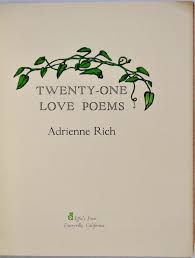Twenty One Love Poems
Adrienne Rich

Philoctetes Radicalized
I want to begin with an allusion Rich makes that will stand as a trope of the career that preceded her feminist work of the seventies. In the eighth of the ‘Twenty-one Love Poems,’ the poet remembers herself ‘years back … / hurting with an infected foot, Philoctetes / in woman’s form, limping the long path’-she is above a cliff, pondering suicide, ‘nursing, measuring that wound.’ The story of Philoctetes, the Greek archer bitten by a venomous snake on the journey to Troy and abandoned by his fellows on the uninhabited island of Lemnos, receives a reading apposite to the case of Rich in Edmund Wilson’s ‘Philoctetes: The Wound and the Bow,’ the famous title essay of a book published, and reprinted numerous times, around mid-century and surely known to Rich.
According to one commentator, Wilson ‘sought to read the [play] Philoktetes as Sophokles’ universal statement on the role of the artist in society: wounded, outcast, lacking some inner quality that might permit him or her to engage in the mundane events of life’ (McNamee 3). But Wilson really constructs this reading by grafting onto Sophocles’ work the symbolist play of the same name by Andre Gide. Gide’s Philoctetes tells his would-be rescuers, Odysseus and the youth Neoptolemus, that during his years alone, ‘I came to under- stand that words inevitably become more beautiful from the moment they are no longer put together in response to the demands of others’ (qtd. in Wilson 288-89).
For Wilson, this ‘anchorite’ who claims that his ‘only care is to be’ is ‘a literary man’ (289).3 Odysseus, in contrast, is a practical man and, not incidentally, a skillful rhetorician, a counterfigure to Gide’s hero, who refuses the world of action and allows the intruders to steal his magic bow. Sophocles’ hero goes on to the Trojan War, but only after he is liberated from his bitter personal isolation by the sympathetic understanding of Neoptolemus.4 The figure of Philoctetes evokes a number of intersecting relations: relations between self and world; self-love, personal love, and love or duty in community; between the poem as self-reflexive utterance (the symbolist ideal) or self-complete dramatic object (the New Critical ideal) and the poem as a rhetorical practice closely linked to political change, which is to say, the poem as an activity of the self grounded in ethos. Adrienne Rich is a poet who, though she continues to write from the lyric ‘I,’ becomes in the seventies increasingly active in the rhetorical dimension, producing a lyric that moves from the pole of pathos-a concept that has virtually defined lyric since the romantics–closer to the pole of rhetoric and ethos.
Since the romantics, and until recently, lyric has been considered a rhetoric-free realm. That is, the relation of poem to audience has been treated as accidental rather than substantial. But lyric has, of course, had a rhetoric. Jerome McGann calls it ‘a rhetoric of dis- placement’ in which ‘the audience is not addressed directly’ (123). The lyric norm, then, as Northrop Frye puts it, echoing John Stuart Mill, is for the poem to be ‘preeminently the utterance that is over- heard’ (249). One important consequence of the norm, McGann writes, ‘is the illusion of freedom which it fosters-as if the reader were not being placed under the power of the writer’s rhetoric’ (123). In other words, since the reader of lyric need not be aware of herself or himself as reader, since the deictics of the poem remain general and the speaker nameless (and typically genderless), the mechanism of identification that powers lyric is relatively simplified. The reader, merging with the poet, becomes the passive consumer of the poet’s experience. My argument here is that by the time of The Dream of a Common Language, Rich has ‘unfictionalized’ a mode of discourse theorized by the New Critics in terms of dramatic propriety and ’embodied’ meaning, as opposed to a propositional or rhetorical meaning. Margaret Atwood’s comment, that ‘Rich’s poems do not demand the willing suspension of disbelief. They demand belief’ (7), gestures in this direction. Rich, in short, radicalizes the lyric mode in the service of a feminist poetics and politics that would erase the ideological lines drawn between the male figures: the political Odysseus, Philoctetes the ‘literary man,’ and the sympathetic or emotional Neoptolemus.5 ~ Taken from Philoctetes Radicalized: ‘Twenty-One Love Poems’ and the Lyric Career of Adrienne Rich by Kevin McGuirk, Contemporary Literature, Vol. 34, No. 1 (Spring, 1993), pp. 61-87. Complete essay at https://www.jstor.org/stable/1208502
Check for it on:
Details
| Genre | Poetry; Grier Rated |
| Publication Date | 1976 |
| Publisher | Effie’s Press |
| Language | English |
| Rating | Great |
| BookID | 13619 |
